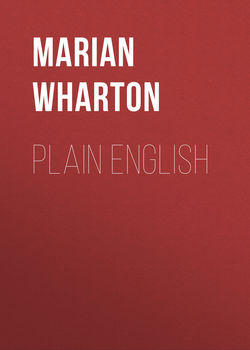Читать книгу Plain English - Marian Wharton - Страница 22
PLAIN ENGLISH
LESSON 3
WORDS USED IN PLACE OF NOUNS
Оглавление42. Now we come to study another class of words which are also very necessary in order to express our ideas. Suppose you had just arrived in a strange town and you wanted to find the way to a friend's house. You inquire of a stranger, "Can you tell me who lives in the house on the corner?"
Notice the words you and me and who. You could not call the stranger by name for you do not know his name, and hence you say you. And if you used your own name instead of me, he would not recognize it, and you would both be puzzled to find a substitute for that little word who.
If you knew the stranger and he knew your name, you might say, "Can Mr. Smith tell Mr. Jones what person lives in the house on the corner." But this would sound very stilted and unnatural and awkward. So we have these little words like you and me and who, which we use in place of nouns. These words are called pronouns. This word is taken from the Latin also. In the Latin the word pro means in place of. So the word pronoun means literally in place of a noun.
43. A pronoun is a word that is used in place of a noun.
These pronouns are very useful little words. They save us a great deal of tiresome repetition. Notice the awkwardness of the following:
The workers will succeed in gaining the workers' freedom if the workers learn solidarity.
And yet this would be the way we would have to express this idea if we did not have pronouns. Instead we say:
The workers will succeed in gaining their freedom if they learn solidarity.
44. We will study the pronoun in detail in later lessons, but we can readily recognize these words which are used in place of nouns. The most common pronouns are:
I
you
he
she
it
we
they
me
him
her
us
them
my
your
his
her
its
our
their
that
which
who
whose
whom
what
Exercise 3
Underscore the pronouns in the following story:
A man in South Africa picked up a small piece of stone. It was dirty and rough.
"Make me beautiful," said the stone.
"I shall have to hurt you," said the man.
"Well, if it hurts me, I will bear it," said the stone.
So the man took it to a clever craftsman, who put it into a tight vise, and cut it with his sharp instrument.
"Oh!" cried the stone.
And he ground it till the dust fell all about it.
"Oh!" cried the stone.
And he polished it very hard.
"Oh!" cried the stone.
And then he set it in a crown and sent it to the Queen. On a sunny day she wore her crown, and the stone—it was a diamond—sparkled in long rays of crimson and green and yellow and silvery white. And all the people greeted their queen. She showed them her crown and they praised the beautiful stone.
The training was hard, but the improvement was glorious.
